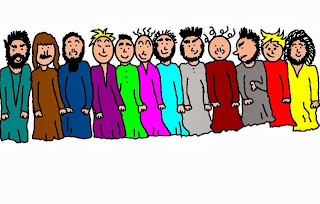A well-known command of Jesus is "Do not judge, or you too will be judged" followed by "take the plank out of your own eye." (Matthew 7:1-6).
What does this mean, since one of the distinctive characteristics of humankind is the ability - and tendency - to use our God-given minds to assess things, events and people?
We drive with a friend and just find ourselves making an opinion about their driving technique - we can't help it. We taste new food and make a judgement - we like it or we don't. We try on new clothes and decide they work for us or they don't. Our minds are constantly making assessments: we are wired to judge.
Jesus cannot mean that we suspend our mind's critical faculties and make no judgements ever again!
Nor can he mean, "do not evaluate someone else's behavior or beliefs". In verse 6 of that very chapter Jesus commands us not to throw pearls to dogs - a command which requires a judgement of who might behave like a 'dog' when presented with spiritual pearls. And later in verse 15 Jesus urges us to judge a person's fruit to assess whether or not they are a true or false prophet. The apostle John urges us to 'test the spirits', and so it goes on.
We are frequently urged in Scripture to use our critical faculties when it comes to both belief and character. Not to do so would quickly lead us into serious spiritual error.
What Jesus does mean
The clue to Jesus' meaning is in his use of the carpentry terms "speck" and "plank". Jesus is referring, not to the sins we find in each other (he deals with that in Matthew 18), but to the weaknesses and foibles we all possess. We are not to spend our lives pointing these out to one another!
We all have weaknesses and foibles that do not constitute sin, but is more about poor manners, silly mistakes or bad habits. Someone forgets to say thank you. Another is always late. Someone never turns the tap off. Another's planning is always lastminute.com. Someone is just so slow. Another is impatiently fast. This one talks forever, that one never talks at all. And so the list goes on. None of these constitutes sins, per se, they are more specks (or planks) than sins.
This is what Jesus means, when commanding us not to judge as we relate to our brothers and sisters:
(1) Avoid a judgmental spirit fullstop (because if you don't you'll get it in the neck, back). If you constantly judge others for their foibles, you will find they judge you back. It's a law of life. A wise man will allow many faults and weaknesses of others to pass by without any comment. "It is in the glory of a man to overlook an offense." (Proverbs 19:11) So if people are constantly judging you, ask yourself: is it because you are constantly judging them? And if so, stop it (!)
(2) Focus on your own foibles, rather the weaknesses of others. The only way to avoid the hypocrisy of constantly pointing out others' faults is to work on your own faults. If we worked on our own considerable planks we would scarce have time to bother with the small weakness-specks of others.
The supreme Example
Jesus' training of the Twelve gives us the supreme example. With twelve rough blokes he must have been surrounded by a thousand specks and planks.
And yet it is only "big stuff" sins that Jesus rebukes. Such as prayerlessness, faithlessness and pride.
Isn't this what love looks like?



No comments:
Post a Comment